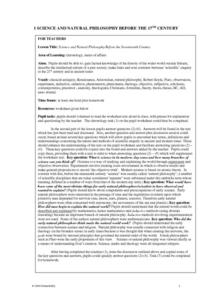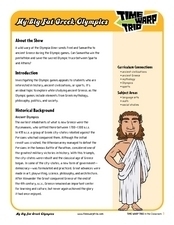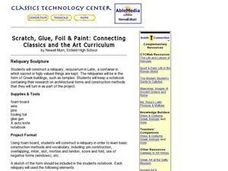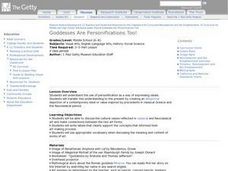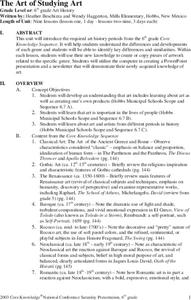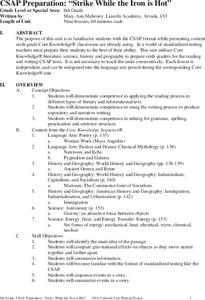Curated OER
When in Greece, Do as the Greeks Do
Students examine the contributions of ancient Greeks in this five lesson unit. The explorations reveal how Greece shaped our stories, our modern language, and our society. The study of the Greek myth forms the basis of this unit.
ProCon
Olympics
Are the Olympic Games a benefit for their host countries and cities? Scholars decide for themselves in preparation for a class debate or discussion. After reading a brief background and overview of the topic, pupils read the top three...
Curated OER
Greek Architecture
Students explore the Parthenon. In this lesson on Greek Architecture, students view a video on classical architecture, then split into groups to research assigned architectural elements such as capitals, columns and floors. They then...
Curated OER
Science and Natural Philosophy Before the Seventeenth Century
Students complete a worksheet about some of the natural philosophers in history. They use graph paper and create a timeline with the dates of birth and names of a list of natural philosophers. They list four questions concerning life and...
Curated OER
Hellenistic World
For this Classical period worksheet, students read over 2 pages of notes about Hellenistic culture and then highlight the important details.
Time Warp Trio
My Big Fat Greek Olympics
The Olympic Games are indeed a significant and far-reaching cultural component in our international community today, but from where do they originate? Where do our traditions stem from, and how do we choose the sports that constitute...
Newspaper in Education
The Iliad: A Young Reader Adventure
Is The Iliad part of your curriculum? Check out a resource that offers something for those new to teaching the classic and those with lots of experience using Homer's epic. Plot summaries, discussion questions, activities abound in this...
Curated OER
From Greece to Main Street
Students consider the influence of the Greeks on American architecture. In this American Greek Revival architecture lesson, students identify the attributes of architectural style as they compare the Parthenon with the Lincoln Memorial....
Curated OER
Scratch, Glue, Foil & Paint: Connecting Classics and the Art Curriculum
Students construct a reliquary using foam board, researching basic Greek and Roman architecture and basic construction methods. They record their research and information in an architectural journal.
Curated OER
Let's Make History -- Together
Students examine different pieces of art from different artists. They are to read "About the Art" before viewing. They create their own plasticine tile showing people in action from history.
Curated OER
Greek Vase Painting Project
Pupils create authentic Greek paintings on clay tiles using knowledge learned about Greek art and painting techniques. This lesson is highly adaptable and can be accomplished in less than a week if focus is altered and less time is...
Curated OER
Italian Renaissance
Fifth graders explore the Italian Rensissance in this six lessons unit. The prominent citizens, the ideas, values, art, philosophy, and literature of the are seen as a rediscovery of Ancient Greek and Roman times.
Curated OER
Argument in an Athenian Jail: Socrates and the Law
Learners read and discuss Socrates's "Crito" and examine the arguments he made supporting his own death penalty. They consider the still-relevant debate between the rights of the individual and the rule of law.
Curated OER
Classical Art
Students study the evolution of Greek and Roman art in pottery and human form. They examine how the artistic evolution is related to discoveries in science and travel through the lessons in this unit.
Curated OER
Tracing the Roots of Modern Cities
Pupils identify several key inventions and other forms of technology that were part of city life during the classical Roman and Greek periods. They report on one characteristic or invention that is shared by modern and ancient cities.
Curated OER
Goddesses are Personifications Too!
Students analyze the use of personification in classical Greek art and the Neoclassical period. For this Neoclassical art lesson, students discuss the cultural values reflected in classical and Neoclassical. Students define a core value...
Curated OER
The Art of Studying Art
Students explain the value of different genres of art. In this art lesson, students describe the differences in various genres of art and make comparisons between them. Students choose an art genre and create an original work of art...
Curated OER
Opera
In this history of opera worksheet, students explore and research what an opera is and then answer four questions regarding the history of opera in complete sentences.
Curated OER
CSAP Preparation: "Strike While the Iron is Hot"
Students survey several concepts in literature, science, history, and geography as a preparation for the CSAP standardized testing experience. This nine lesson unit provides exposure to the format and content of the test.
Curated OER
The Renaissance was a Rebirth
In this Renaissance study guide worksheet, students read a brief overview pertaining to the time period in world history and then respond to 4 reflection questions.
Curated OER
Teaching the Hindu-Buddhist Tradition in East Asian Culture Through Asian Literature and Film
Students explore various intellectual traditions which dominate human history through a variety of contemporary pieces of literature which exemplify the traditions. Biblical monotheism, Greek rationalism, Hinduism, Buddhism, Confucianism...
Curated OER
The Fates
In this language arts worksheet, high schoolers read the article and define the concepts of life by comparing the parts of life that culminates in death.
Curated OER
Restoring the Nike
Students explore the roles of artists, art historians and archaeologists. They discover the role of professionals in restoring lost or damaged artwork. Students examine the characteristics of Greek art.
Curated OER
Leonardo da Vinci: Creative Genius
Young scholars discuss how Leonardo Da Vinci reflected the spirit of the Renaissance. They examine his achivements and explain the significance of his notebooks. They write essays on what constitutes a "rRenaissance man."





